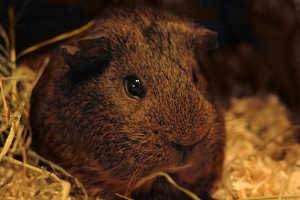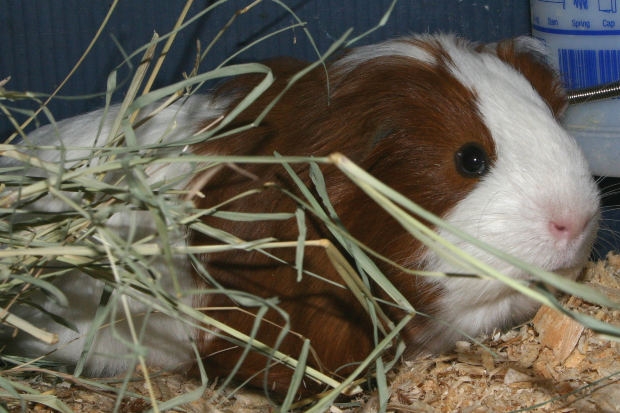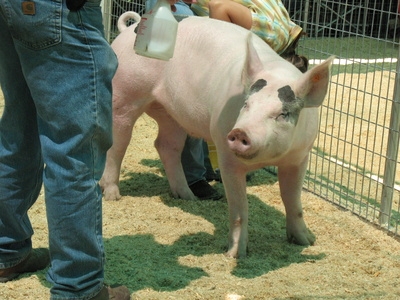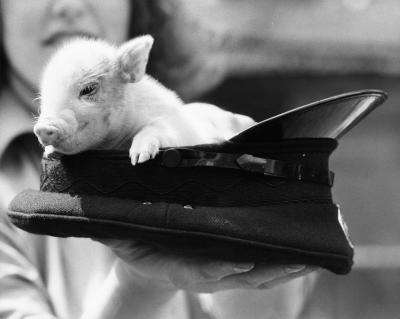Most of it is caused by the standards in "factory farms" - large pig breeding enterprises where pigs are crowded together in conditions that aren't anything like what life for a pig on a small farm would be. Fear, confinement, and rapidly spreading disease would normally kill the animals, so they are pumped up with antibiotics to keep them alive until slaughter.
Mother pigs are kept in gestation crates where they aren't even able to turn around. They are artificially inseminated and give birth to about two litters of piglets each year - one after the other. Their piglets have to nurse through the bars of the crates. They are taken away from their mothers when they are only a few weeks old - much earlier where they would be on a farm, where mothers and babies have a strong slitting machine bond. They are castrated and have their tails removed without anesthetic. At four months old or so, they are sent to slaughter. If they become ill before that, they are shot in the head with a bolt gun.
Then there is cruelty - beyond the daily "normal" cruelty of being crowded, ill, and living in fear - inflicted by workers at the plants. Videos have shown workers pulling pigs by their snouts, poking out their eyes, kicking them, and beating them with hammers and gate rods.
If all this sounds disturbing, videos of pigs being mistreated and living in such horrible conditions are even worse. What makes it sadder is that pigs are intelligent - smarter than a dog and a three-year-old child, according to some studies - and under better conditions can live into their teens and form social bonds with other pigs.
So what can you do to help the pigs? Stop eating meat and go vegan is what is recommended by most animal rights groups and other vegans. For some, this is not an option- a pig equals food, and its just not possible to go without pork.
Perhaps a simpler alternative is to be aware of where your pork comes from. Stop buying pork from large producers. Instead, shop at farmers markets or even at a local farm. Do some research and visit the farm if you can. Or try natural food stores like Whole Foods, which has standards that their suppliers must meet, including better treatment of pigs. While there is no guarantee that the slitting machine guidelines are actually followed, there is a much better chance that the pig was raised in more of a natural way than on a factory farm. There are also benefits to your own health from going this route - you won't be eating meat tainted by poor practices and injections of antibiotics and hormones.
You can also support legislation that abolishes intensive-confinement systems like gestation crates, and read up on other ways to reduce the pain of factory farms.Many of the pigs die on the way to slaughter, where they are packed in tight into transport vehicles with no climate control. Some are found frozen to the sides of the truck. Some are crushed or trampled. At slaughterhouses, sometimes the stun gun or the slitting machine doesn't do the job, and pigs are still conscious when they're throats are slit, still alive when they are put into boiling water, where they drown.

 What Homemade Toys Can One Make for a Guinea Pig?
What Homemade Toys Can One Make for a Guinea P
What Homemade Toys Can One Make for a Guinea Pig?
What Homemade Toys Can One Make for a Guinea P
 How to Build a Wooden Guinea Pig Cage
How to Build a Wooden Guinea Pig Cage
How to Build a Wooden Guinea Pig Cage
How to Build a Wooden Guinea Pig Cage
 Guinea Pig Cage Ideas
Guinea Pig Cage Ideas
Guinea Pig Cage
Guinea Pig Cage Ideas
Guinea Pig Cage Ideas
Guinea Pig Cage
 How to Guess a Pig's Weight
How to Guess a Pig's Weight
How t
How to Guess a Pig's Weight
How to Guess a Pig's Weight
How t
 How to Play With a Mini Pig
How to Play With a Mini Pig
How to Pla
How to Play With a Mini Pig
How to Play With a Mini Pig
How to Pla